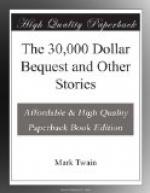“Said Sciatti was suddenly harvested (gathered in?) by several citizens, who by means of public cab No. 365 transported to St. John of God.”
Paragraph No. 3 is a little obscure, but I think it says that the medico set the broken left leg—right enough, since there was nothing the matter with the other one—and that several are encouraged to hope that fifty days well fetch him around in quite giudicandolo-guaribile way, if no complications intervene.
I am sure I hope so myself.
There is a great and peculiar charm about reading news-scraps in a language which you are not acquainted with—the charm that always goes with the mysterious and the uncertain. You can never be absolutely sure of the meaning of anything you read in such circumstances; you are chasing an alert and gamy riddle all the time, and the baffling turns and dodges of the prey make the life of the hunt. A dictionary would spoil it. Sometimes a single word of doubtful purport will cast a veil of dreamy and golden uncertainty over a whole paragraph of cold and practical certainties, and leave steeped in a haunting and adorable mystery an incident which had been vulgar and commonplace but for that benefaction. Would you be wise to draw a dictionary on that gracious word? would you be properly grateful?
After a couple of days’ rest I now come back to my subject and seek a case in point. I find it without trouble, in the morning paper; a cablegram from Chicago and Indiana by way of Paris. All the words save one are guessable by a person ignorant of Italian:
Revolverate in teatro
PARIGI, 27.—La Patrie ha da Chicago:
Il guardiano del teatro dell’opera di Walace (Indiana), avendo voluto espellare uno spettatore che continuava a fumare malgrado il diviety, questo spalleggiato dai suoi amici tir`o diversi colpi di rivoltella. Il guardiano ripose. Nacque una scarica generale. Grande panico tra gli spettatori. Nessun ferito.
Translation.—“Revolveration in Theater. Paris, 27th. La Patrie has from Chicago: The cop of the theater of the opera of Wallace, Indiana, had willed to expel a spectator which continued to smoke in spite of the prohibition, who, spalleggiato by his friends, tire (Fr. Tire, Anglice pulled) manifold revolver-shots; great panic among the spectators. Nobody hurt.”
It is bettable that that harmless cataclysm in the theater of the opera of Wallace, Indiana, excited not a person in Europe but me, and so came near to not being worth cabling to Florence by way of France. But it does excite me. It excites me because I cannot make out, for sure, what it was that moved the spectator to resist the officer. I was gliding along smoothly and without obstruction or accident, until I came to that word “spalleggiato,” then the bottom fell out. You notice what a rich




